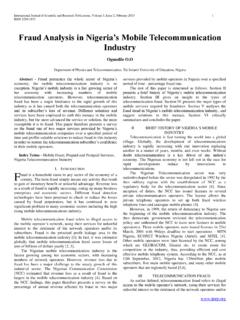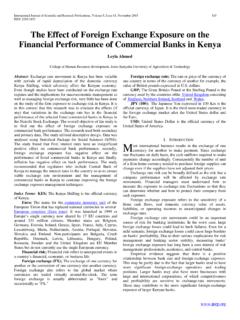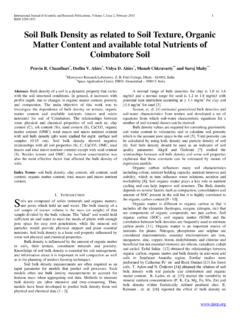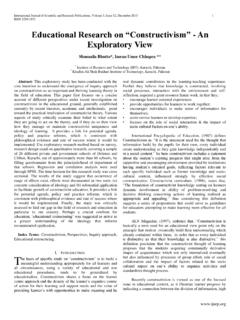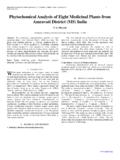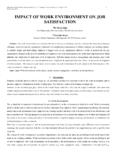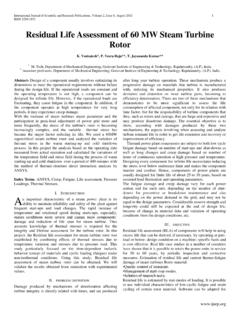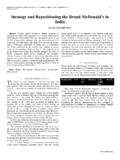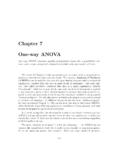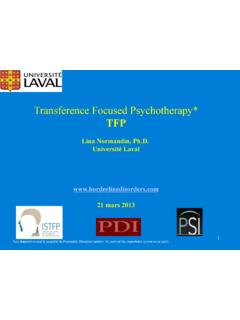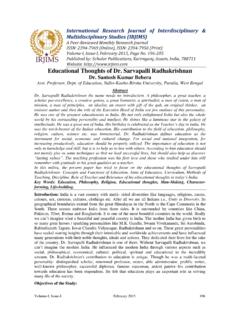Transcription of Philosophy for Children: A Model for Unhu/Ubuntu …
1 International Journal of Scientific and Research Publications, Volume 4, Issue 2, February 2014 1 ISSN 2250-3153 Philosophy for children : A Model for Unhu/Ubuntu Philosophy . Ndondo Shepherd &Daniel Mhlanga Lupane State University Abstract- The African communitarian way of life, Unhu/Ubuntu , has suffered unprecedented decline in recent years. This is mainly attributed to cultural pluralism. Notwithstanding the decline in morality, Unhu/Ubuntu still exists. The essentials of Unhu/Ubuntu must continually get emphasis from societal institutions. It is for this cause that this paper seeks to justify the use of Philosophy for children Model in schools to foster Unhu/Ubuntu . A brief account of Unhu/Ubuntu will be given. The Philosophy for children Model will be discussed relative to ubuntu . Lastly the paper will suggest ways of employing Philosophy for children to revive Unhu/Ubuntu .
2 Index Terms- ubuntu ; Philosophy for children I. INTRODUCTION re-modern Africa was characterised by an enduring moral fibre which sustained traditional societies. The main force behind this cultural moral presentation was the Philosophy of ubuntu . This entails an African communitarian way of life which can be easily summed up by the popular aphorism, a person is a person through relationships with other people . In African traditional societies an individual was defined according to the environing community. Everything was viewed in terms of common good, even individual talents were treated as common assets (Makuvaza, 1996; Samkange and Samkange, 1980).Immorality by an individual was a disgrace to the whole community. On the other hand, the success of a community member was a community s success. This was because any behaviour pattern was supposed to be a reflection of the community s values.
3 Although not much formalised, traditional education had the main aim of producing people who were acceptable in that particular community. ubuntu was not confined to individual communities as the values could be exhibited beyond the bounce of these communities. The advent of political societies (when central governments emerged) and general cultural pluralism brought with it adverse effects on African morality. There is high incidence of moral degeneration in Zimbabwe today (Nziramasanga, 1999). This can be attributed mainly to a culturally plural environment in which children are socialised. The community group ethic which subjected all children to some form of discipline from any old person has declined. Formal schools have become critical places for children s moral development as they spend most of their time at these institutions starting from a tender age.
4 It is therefore imperative to resuscitate the African moral ethic, ubuntu , through exploitation of Philosophy for children advocated by Lipman at Montclair University in the 1970s (Kennedy, 2000; Daniel and Auriac, 2009). This Philosophy , if adopted in an African setting, is hoped would resuscitate the declining African morality. This may be done in light of the methodologies used in Philosophy for children which are compatible with African traditional moral values. It can be argued that if these values begin to have emphasis at a tender age through the education system, ubuntu can be realised. It must, however, be appreciated that ubuntu can no longer be captured in its pre-modern genre due to cultural dynamism (Makuvaza, 1996). The essentials can be instilled in learners for cultural moral revival.
5 Our argument is that, since the concept of Philosophy for children has distinct overlaps with African moral values, its introduction at an early age is expected to foster communal and democratic ethics among other values espoused by ubuntu . This will in turn lead to a society with morally upright citizens who respect fellow citizens, tolerate people of diverse cultures and citizens who work towards common objectives for the betterment of the society. II. CONCEPTUAL FRAMEWORK This piece of work is mainly hinged on the nature of Philosophy for children , its pedagogy and how these qualities can help resuscitate the concept of ubuntu in view of the current moral degeneration in our society. It is therefore imperative to first discuss the rationale for introducing Philosophy , the nature and principles of the two concepts under discussion, thus, Philosophy for children and ubuntu .
6 III. NATURE OF Philosophy FOR children For many years, dating back from classical times, Philosophy was considered to be the domain for adults. Plato clearly showed his intention to restrict the accessibility of Philosophy to youngsters when he maintained that the dialectic was a double edged sword that could prove to be subversive if used by a person who lacked the necessary rationality and maturity (Daniel and Auriac, 2009). This assertion even got more support following Piaget s theory of cognitive development with some philosophers maintaining that youngsters are not capable of thinking critically and reflectively. Some arguments against engaging children in Philosophy were based on the premise that there are certain conditions needed for one to study this discipline. These are the learners knowledge and maturity as well as his intrinsic motivation to comprehend philosophical texts.
7 Such motivation, it was argued, is rather absent in children (Murris, 2000). P International Journal of Scientific and Research Publications, Volume 4, Issue 2, February 2014 2 ISSN 2250-3153 As this discipline was considered unfit for children , it is no wonder why it seems to be exclusively offered to students in colleges and universities (Kennedy, 2000). In consideration of the notion that the essence of Philosophy is critical thinking (Daniel and Auriac, 2009), Lipman (1988) getting the influence from Vygotsky(1985) sees critical thinking as the main element prevalent in children through verbal exchange among peers. Although some philosophers contest the introduction of Philosophy for children in the classroom suggesting that the discussions by children it fosters are not philosophical, Socrates argues that through questioning, critical thinking is enhanced and children discover knowledge.
8 For Socrates, knowledge is not a preserve for adults, but would rather be discovered by the learner himself. Knowledge is considered a never achieved awareness that is constructed and reconstructed in and by the questioning (Murris, 2000). As Lipman et. al, (1980) view it, this complex philosophical thinking needs to be nurtured in children as it is neither innate nor magic. We consider Daniel and Auriac s (2009) sentiments that it is not because one enters adulthood that one automatically becomes a critical thinker. In the same vein Mathews (1994:18) says maturity brings staleness and uninventiveness to the exploitation of philosophical ideas while children are often fresh and inventive thinkers . In most cases adults perceptions maybe taken differently by children , so childhood can be said to be the best time to capture children s philosophical aptitudes.
9 An American philosopher, Mathew Lipman, proposed a Philosophy for children programme in the 1970s (Kennedy 2000; Daniel and Auriac, 2009), and to date the programme has been implemented in fifty countries, its material has been translated into twenty languages (Daniel and Auriac, 2009). This is being done in the light of the need to develop critical thinking in children through philosophical dialogue which evolves in a perspective to enrich group perspective as opposed to argumentation for individual ends (Lipman, 2003). In reference to the good qualities of Philosophy for children , Accorint (2000) saw it as an education proposal that makes it possible for teenagers to develop complex thinking and therefore their reasoning abilities, critical, caring and creative thinking. There are defined procedures to be followed in Philosophy for children .
10 In most cases children begin by reading texts in form of stories. These stories might be fictional but related to children s experiences. These stories should have themes which enable children to reason more effectively and show how they can apply their reasoning to life situations. The stories which should be used in a classroom setting should have many themes touching on children s experiences. children will use the democratic processes to choose the themes to discuss. All members ( children ) are treated as equals in the dialogical process. Alternatively, children may come up with questions concerning ambiguous or paradoxical situations that intrigue them for discussion. Philosophy for children can be fostered through the holding of a dialogue in a group to construct elements of response to their questions so as to fulfil their common objectives.
